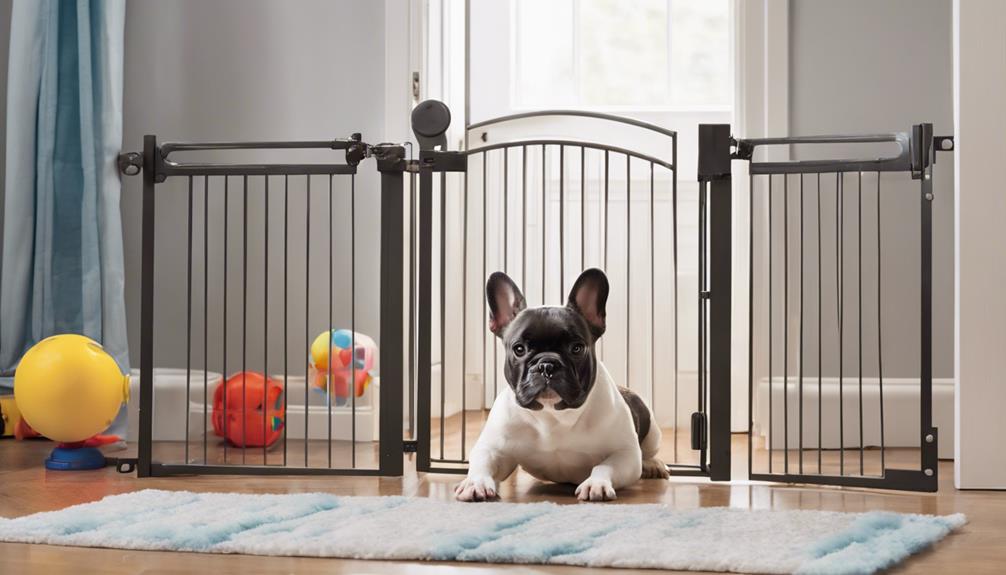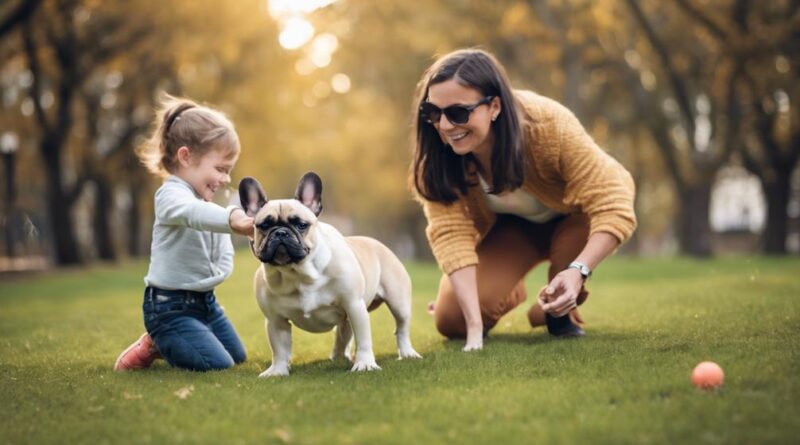8 Best Practices for French Bulldogs With Children
To ensure a positive bond between your French Bulldog and kids, follow these 8 crucial best practices: Always supervise their interactions for safety. Set clear boundaries and be consistent. Teach gentle play using positive reinforcement. Train your Frenchie regularly and employ effective behavior management. Allow for socialization in new settings. Recognize stress signals and respond accordingly. Create a safe environment for both dog and child. Remember regular vet check-ups to maintain health. By implementing these practices, you can foster a harmonious and secure relationship between your French Bulldog and children.
Supervised Interactions
When introducing French Bulldogs to children, it's crucial to ensure supervised interactions for the safety and well-being of both the child and the dog. Playtime etiquette and safety are paramount during these interactions. French Bulldogs are known to be loving and gentle companions, especially towards children, but parental supervision and education are essential to ensure that interactions are positive and safe for all involved.
During playtime, it's important to teach children how to properly interact with French Bulldogs. Encourage gentle petting and avoid rough play that may agitate the dog. Teach children to respect the dog's space and signals. Supervising these interactions allows parents to intervene if play becomes too rough or if the dog shows signs of discomfort.
Additionally, educating children on how to recognize when a French Bulldog needs space or is feeling overwhelmed is crucial. Understanding canine body language can prevent accidents and ensure a harmonious relationship between the child and the dog. Parents should teach children to approach the dog calmly and to avoid sudden movements that may startle the French Bulldog.
Establish Boundaries
To ensure a safe and positive interaction between French Bulldogs and children, establishing clear boundaries is essential. When setting boundaries, remember that consistency is key. Here are three crucial aspects to consider when establishing boundaries:
- Consistent Rules: Consistency in rules and expectations is vital when setting boundaries for interactions between French Bulldogs and children. Make sure that everyone involved understands and follows the established guidelines. Consistent boundaries help the French Bulldog feel secure and understand what's expected of them.
- Use Positive Reinforcement: Positive reinforcement is a powerful tool when establishing boundaries. Reward good behavior with treats, praise, or playtime. When the French Bulldog respects the boundaries set with the children, reinforce this behavior positively. This approach helps create a positive association with following the rules.
- Clear Communication: Clear communication is essential when setting boundaries. Ensure that children understand why specific rules are in place and the importance of respecting them. Teach children how to interact safely and appropriately with the French Bulldog. Open communication fosters understanding and strengthens the bond between the children and the French Bulldog.
Teach Gentle Play
Establishing clear boundaries with French Bulldogs and children lays the foundation for teaching gentle play to ensure a harmonious interaction. When it comes to fostering a safe and enjoyable environment for both your French Bulldog and your child, positive reinforcement is key. Encouraging gentle play through positive interactions will help your furry friend understand what behavior is appropriate.
One effective way to teach gentle play is through interactive games. Incorporating games that promote calm and controlled behavior can be both educational and entertaining for your French Bulldog and child. For instance, playing games that require gentle actions, such as fetch with a soft toy, can help reinforce the idea of being gentle during playtime. Remember to praise and reward both your child and your French Bulldog for engaging in these activities calmly and respectfully.
Additionally, redirecting behavior that becomes too rough is crucial in teaching gentle play. If play starts to escalate and become too intense, intervene by calmly separating the child and the dog, and then redirect their focus to a more appropriate activity. Consistency in redirecting and reinforcing positive behavior is essential for your French Bulldog to learn how to play gently with your child.
Consistent Training
Consistent training is essential for fostering a positive and well-behaved relationship between your French Bulldog and your child. When it comes to training your French Bulldog to interact appropriately with your child, incorporating positive reinforcement techniques and effective behavior management strategies is crucial.
Here are three key practices to help you navigate the training process:
- Positive Reinforcement: Utilize positive reinforcement techniques such as treats, praise, and toys to encourage good behavior in your French Bulldog when interacting with your child. Rewarding positive interactions will reinforce the desired behavior and create a strong bond between your pet and your little one.
- Consistent Rules: Establish clear and consistent rules for both your French Bulldog and your child to follow during their interactions. Consistency in expectations will help prevent confusion and promote a harmonious relationship between your pet and your little one.
- Behavior Management: Implement effective behavior management strategies to address any undesirable behaviors that may arise during interactions between your French Bulldog and your child. Consistent correction and redirection techniques can help shape positive behavior and ensure a safe environment for both your pet and your little one.
Socialization Opportunities
When introducing your French Bulldog to socialization opportunities, consider exposing them to various environments and interactions with different people, animals, and situations. This exposure helps your French Bulldog become more adaptable and comfortable in various social settings.
One way to achieve this is by engaging your French Bulldog in playgroups. These playgroups provide a structured environment where your dog can interact with other dogs, helping them develop essential social skills and manners.
Another beneficial socialization opportunity for your French Bulldog is pet therapy. In pet therapy sessions, your dog can interact with different people in a controlled environment. This can help your French Bulldog become more comfortable around strangers and children, which is especially important when considering their interactions with kids.
Additionally, pet therapy can also help your dog build confidence and reduce anxiety in unfamiliar situations.
It's essential to introduce these socialization opportunities gradually and ensure that your French Bulldog feels safe and secure during these interactions. Always monitor your dog's behavior and comfort level to ensure that the experiences are positive and enriching.
Recognize Stress Signals
Can you identify the stress signals that your French Bulldog may display in various social situations? Understanding your French Bulldog's body language is crucial in managing their anxiety and ensuring their well-being. Here are three key stress signals to watch out for:
- Facial Expressions: Your French Bulldog's face can reveal a lot about their emotional state. Signs of stress may include a furrowed brow, wide eyes, or lips pulled back. If you notice these expressions, it's essential to give your dog space and assess the situation to alleviate their anxiety.
- Body Posture: Pay attention to how your French Bulldog carries themselves. A stressed dog may exhibit tense body language, such as a stiff stance, raised hackles, or a lowered head. These postures signal discomfort and should prompt you to address the trigger causing their anxiety.
- Vocalizations: French Bulldogs may vocalize when feeling stressed. Whining, whimpering, or excessive barking can indicate unease. Responding promptly and appropriately to these vocal cues can help manage your dog's anxiety and create a more comfortable environment for them.
Safe Environment

Creating a secure environment for your French Bulldog is paramount to their well-being and comfort. When it comes to ensuring the safety of both your Frenchie and your children, puppy proofing and childproofing are essential practices.
Begin by puppy proofing your home to eliminate potential hazards for your French Bulldog. Keep small objects, toxic plants, electrical cords, and household chemicals out of reach. Secure cabinets and trash cans to prevent your Frenchie from accessing harmful substances.
Supervision is key when your French Bulldog is interacting with children. Teach your kids to approach the dog calmly and with respect for their space. Encourage gentle interactions and provide a safe space where your Frenchie can retreat if they feel overwhelmed. Consistent supervision ensures that both your pet and your children are safe during their interactions.
In addition to puppy proofing, consider childproofing your living space to prevent accidental injuries to both your children and your French Bulldog. Establish boundaries and teach your children how to properly interact with the dog. Training your Frenchie to respond to basic commands can also help create a safe environment for everyone involved.
Regular Vet Check-ups
Ensuring your French Bulldog receives regular vet check-ups is essential for maintaining their health and well-being. Regular visits to the vet not only help in preventing potential health issues but also ensure that your furry friend is up to date on vaccinations and overall well taken care of.
Here are three key aspects to consider regarding regular vet check-ups:
- Preventative Care: Regular vet check-ups allow the veterinarian to conduct thorough physical examinations of your French Bulldog. By detecting any potential health concerns early on, preventative measures can be taken to address them promptly. This proactive approach can help in maintaining your French Bulldog's health and preventing more serious issues down the line.
- Vaccination Schedule: Veterinarians follow a specific vaccination schedule tailored to your French Bulldog's needs. Vaccines are crucial in protecting your dog from various diseases and illnesses. Ensuring that your French Bulldog is up to date on all necessary vaccinations during their regular vet check-ups is vital for their overall health and longevity.
- Professional Guidance: Regular vet check-ups also provide you with the opportunity to seek professional advice and guidance regarding your French Bulldog's diet, exercise routine, and any behavioral concerns. Your veterinarian can offer personalized recommendations to ensure that your French Bulldog is living their happiest and healthiest life.
Frequently Asked Questions
Can French Bulldogs Be Left Alone With Children Unsupervised?
You shouldn't leave French Bulldogs alone with children unsupervised. It's crucial to establish clear supervision boundaries to ensure the safety of both the dog and the child.
Pay attention to behavioral cues from the dog when around kids. While French Bulldogs are generally good with children, it's always best to have an adult present to oversee interactions and intervene if needed.
Prioritize safety and supervision to prevent any potential accidents.
How Do I Introduce a French Bulldog to a New Baby?
When introducing a new baby to your French Bulldog, take it slow and follow these steps.
Begin by creating a positive association by allowing your pet to sniff the baby's items.
Next, supervise interactions closely, rewarding calm behavior.
Gradually increase exposure while always prioritizing safety.
Building trust between your Frenchie and the baby is key.
What Age Is Appropriate to Start Training a French Bulldog With Children?
When training your French Bulldog with children, it's essential to start early. Begin puppy socialization and basic obedience from a young age.
Use positive reinforcement and consistency to reinforce good behavior. This will help your Frenchie build a strong foundation for interacting with kids.
Are French Bulldogs Good With Children of All Ages?
French Bulldogs are generally good with children of all ages. However, it's crucial to establish playtime boundaries and ensure proper socialization. Supervision is key to maintain a safe environment, and clear communication between the child and dog is essential.
How Can I Prevent Jealousy Between My French Bulldog and Child?
To prevent jealousy between your French bulldog and child, focus on building trust and setting clear boundaries. Manage interactions between them and use positive reinforcement to encourage good behavior. Ensure that both your dog and child feel loved and valued.
Conclusion
In conclusion, implementing these best practices for French Bulldogs with children will help ensure a safe and harmonious relationship between the two.
By supervising interactions, setting boundaries, and teaching gentle play, you can create a positive environment for both your dog and your child.
Consistent training, socialization opportunities, and recognizing stress signals are crucial for fostering a strong bond.
Remember to provide a safe environment and schedule regular vet check-ups to keep both your furry friend and child happy and healthy.
